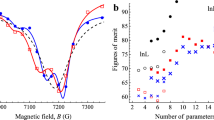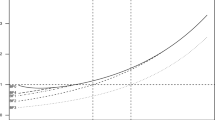Abstract
ADVANCES in fundamental theory have often been guided by the principle that reliance is to be placed on the most directly observed quantities, that is, those involving least theoretical assumptions. This letter indicates the interpretations of Planck's constant (h) and of the fine-structure constant (α) which follow from this principle1.
This is a preview of subscription content, access via your institution
Access options
Subscribe to this journal
Receive 51 print issues and online access
$199.00 per year
only $3.90 per issue
Buy this article
- Purchase on Springer Link
- Instant access to full article PDF
Prices may be subject to local taxes which are calculated during checkout
Similar content being viewed by others
References
A fuller treatment, with references on lengths, will appear in B. J. Phil. Sci., 1.
Whyte, L. L., Z. Phys., 56, 809 (1929); “Critique of Physics” (1931). Fürth, R., Z. Phys., 57, 429 (1929). Podolsky, B., Phys. Rev., 46, 734 (1934). Born, M., Proc. Ind. Acad. Sci., (2), 6, 533 (1935). Flint, H. S., Proc. Roy. Soc., A, 159, 45 (1937).
Heisenberg, W., Z. Phys., 101, 533 (1936).
Author information
Authors and Affiliations
Rights and permissions
About this article
Cite this article
WHYTE, L. Planck's Constant and the Fine-Structure Constant. Nature 166, 824–825 (1950). https://doi.org/10.1038/166824b0
Issue Date:
DOI: https://doi.org/10.1038/166824b0
Comments
By submitting a comment you agree to abide by our Terms and Community Guidelines. If you find something abusive or that does not comply with our terms or guidelines please flag it as inappropriate.



